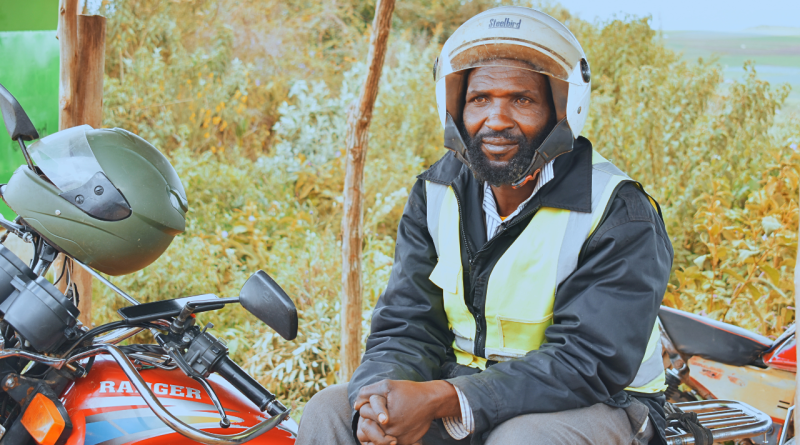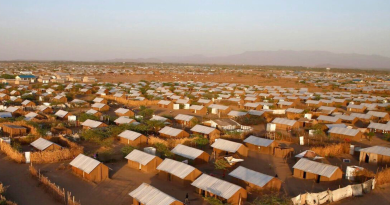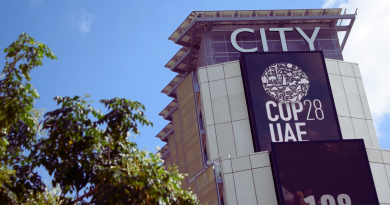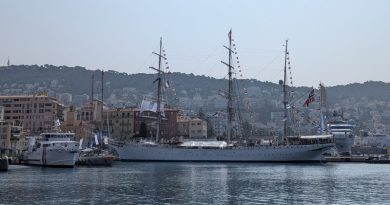Eburru Boda Boda Riders Lead Conservation Efforts to Save Indigenous Forests
By Chemtai Kirui
Eburru, Naivasha – Peter Njuguna Gachie, a boda boda rider, never imagined his work would contribute to environmental sustainability—until a recent training on conservation and road safety changed his perspective.
Sitting astride his well-maintained red motorcycle at the Morgen Boda Boda station, Gachie could barely contain his excitement as he spoke about how the training had transformed not only his understanding of his trade but also his role in protecting the endangered Eburru forest, which is home to the critically endangered mountain bongo.
“Before, I never saw the connection between my job and the forest’s destruction,” Gachie said, glancing around at the small Morgen market, where shops lined one side of the dusty road and boda boda riders gathered under a shade on the other awaiting clients. Behind them, the vast land stretched out, bordering a small patch of forest.
“The training opened my eyes,” he said
The training, organized by the National Transport and Safety Authority (NTSA) and Rhino Ark Charitable Trust, aimed to educate boda boda riders on road safety and environmental conservation.
This newfound understanding of conservation isn’t unique to Gachie.
Fifty boda boda riders were selected and trained across the villages of Morgen, Songoroi, and Eburru.
Now, every month, these riders meet at designated boda boda stations to reinforce their training, exchange road safety tips, and participate in community clean-up activities.

They also take time to engage with local residents, sharing their newfound knowledge and encouraging sustainable practices.
“One of the things we learned during the training was the importance of replacing piston rings in our motorcycles to reduce harmful emissions,” Gachie said. “I’ve started sharing this knowledge with other riders during our meetings. Slowly, we’re all learning to reduce our carbon footprint.”
Motorcycles and the Forest’s Decline
The Eburru forest, part of the larger Mau Complex, is a biodiverse sanctuary, with its dense canopy and diverse plant life providing crucial habitat for various species, while also serving as a key water catchment area for the surrounding communities.

Over the years, this indigenous forest has faced mounting pressure from encroachment, poaching, illegal logging, and charcoal burning. Boda bodas, often used to transport firewood and timber, have unintentionally exacerbated the destruction by making the forest more accessible to outsiders.
Gachie, born and raised in Eburru, has watched these changes firsthand.
He now understands how certain activities—particularly the increasing use of motorcycles in the illicit trade—have inadvertently placed immense pressure on the forest.

This shift in awareness showcases the role boda boda riders, like Gachie, play in conservation—especially in forested regions, where their involvement is key to slowing the destruction of ecosystems that contribute to deforestation.
According to Joseph Mutongu, the fence community manager at Rhino Ark Trust, who works closely with Eburru’s community conservation champions, the training of boda boda riders was essential as they are central to the community and have significant influence over daily activities.
“Boda boda riders are central to the community,” Mutongu says. “By educating them, we’re not just reducing environmental harm; we’re turning them into messengers of change. They can inspire others to adopt better practices.”

Mutongu said the training program offers a unique solution to the dual challenges of road safety and environmental degradation in the region by equipping riders with skills that not only help protect the environment but also promote road safety and improve their livelihoods.
“Riders were taught better motorcycle maintenance, safe driving techniques, and environmental conservation practices, all of which contribute to safer roads and more sustainable, profitable businesses,” he said.
Since completing the two months training which began in late 2023, the riders have taken their role seriously. In addition to maintaining their motorcycles to reduce emissions, they’ve started clean-up campaigns, educating locals on responsible forest use.
Eburru’s Forest Guardians
While the boda boda riders are tackling conservation from the roads, the Eburru Community Forest Association (CFA) is leading efforts to promote sustainable land use.
Local farmers are now integrating trees into their farming systems. This includes planting fruit trees, which they sell for economic benefit, propelling sustainable practices further.

“Before planting fruit trees, my land was full of idle trees,” said John Maina, a retired teacher, a farmer and the deputy chairperson of the Eburru Community Forest Association (CFA). “Now, I earn from oranges, avocados, and mangoes. This has helped me pay school fees for my children and even host other farmers who want to learn.”

The CFA is also preserving traditional knowledge about medicinal plants on paper.
A new guidebook, titled Common Medicinal Plants of Eburru Forest, authored by community members, explores the various uses of the forest’s flora.
Available for visitors, the publication doubles as a learning tool and a source of funding for conservation efforts.

“Our connection to the forest runs deep,” says Douglas Chege Gichuru, a senior forest guide at Eburru and the author of the publication. “By compiling this resource, we’re preserving our heritage and teaching others the immense value of the forest.”
The projection is to have the self – published guidebook available on the bookshelves, countrywide.
The Eburru Community Conservation Champions initiative, is part of Rhino Ark Kenya’s effort to promote conservation by balancing forest and wildlife protection with the livelihoods of local communities.
CFA members are saying that the efforts are already bearing fruit.
“Rainfall has returned, just like it was before the forest was damaged,” said Lydia Nyota, Chairperson of the CFA, adding that the improved weather pattern has boosted farming, leading to better livelihoods and encouraging more people to join the conservation movement.

Nyota, who lives in the Morgen area of Eburru, said that other eco- friendly measures like biogas use have gained traction in the community.
“We would much rather protect the forest, as it sustains us, than contribute to its destruction,” she said.
Sustaining the Momentum
As the trained boda boda riders continue spreading conservation messages, their efforts indicate the potential of grassroots initiatives to tackle global challenges like climate change and biodiversity loss.
“For me, it’s a victory to see locals actively nurturing the forest,” Mutongu said.
With determination, Eburru’s conservation champions are driving a greener future—one ride at a time.




